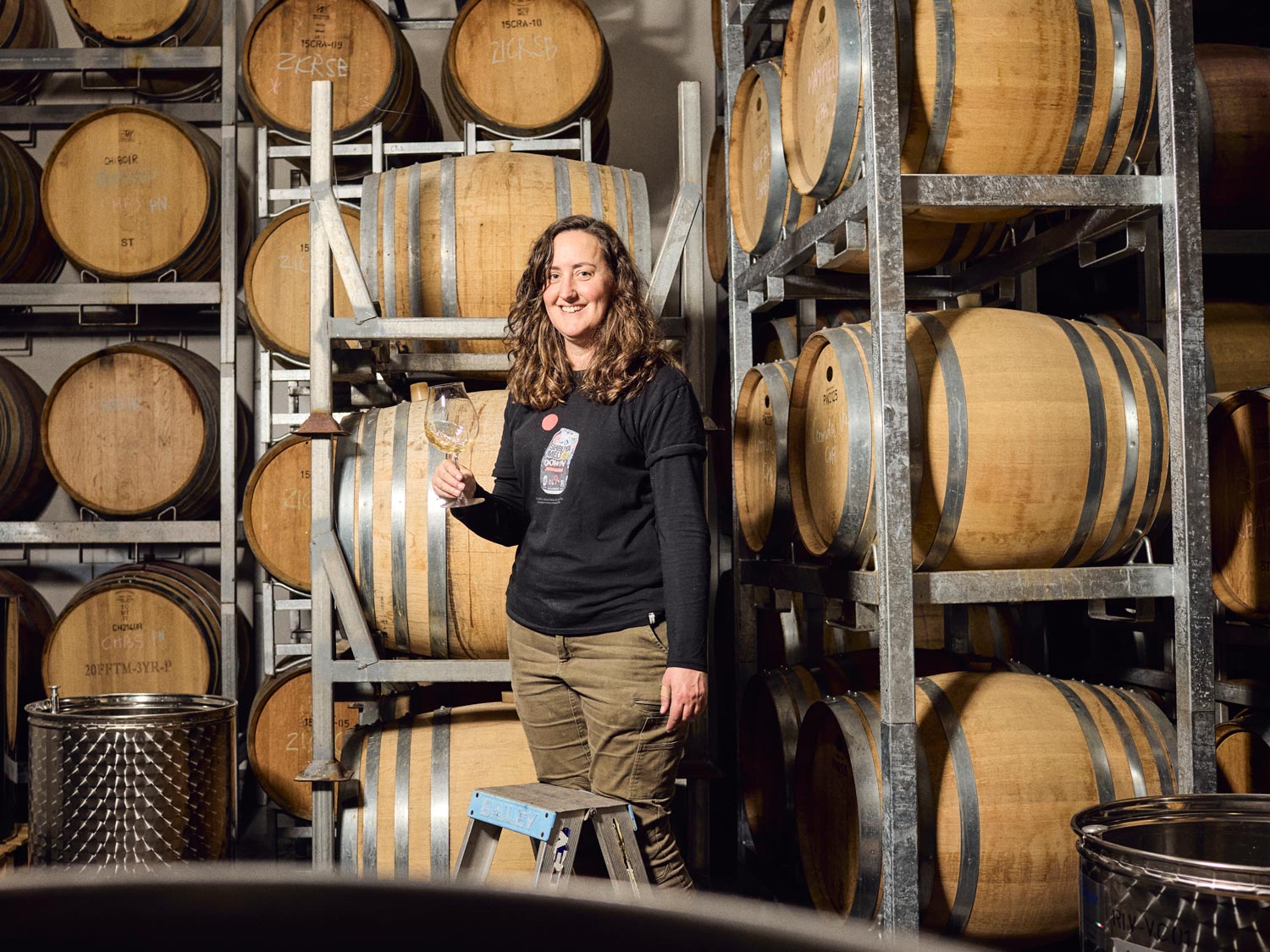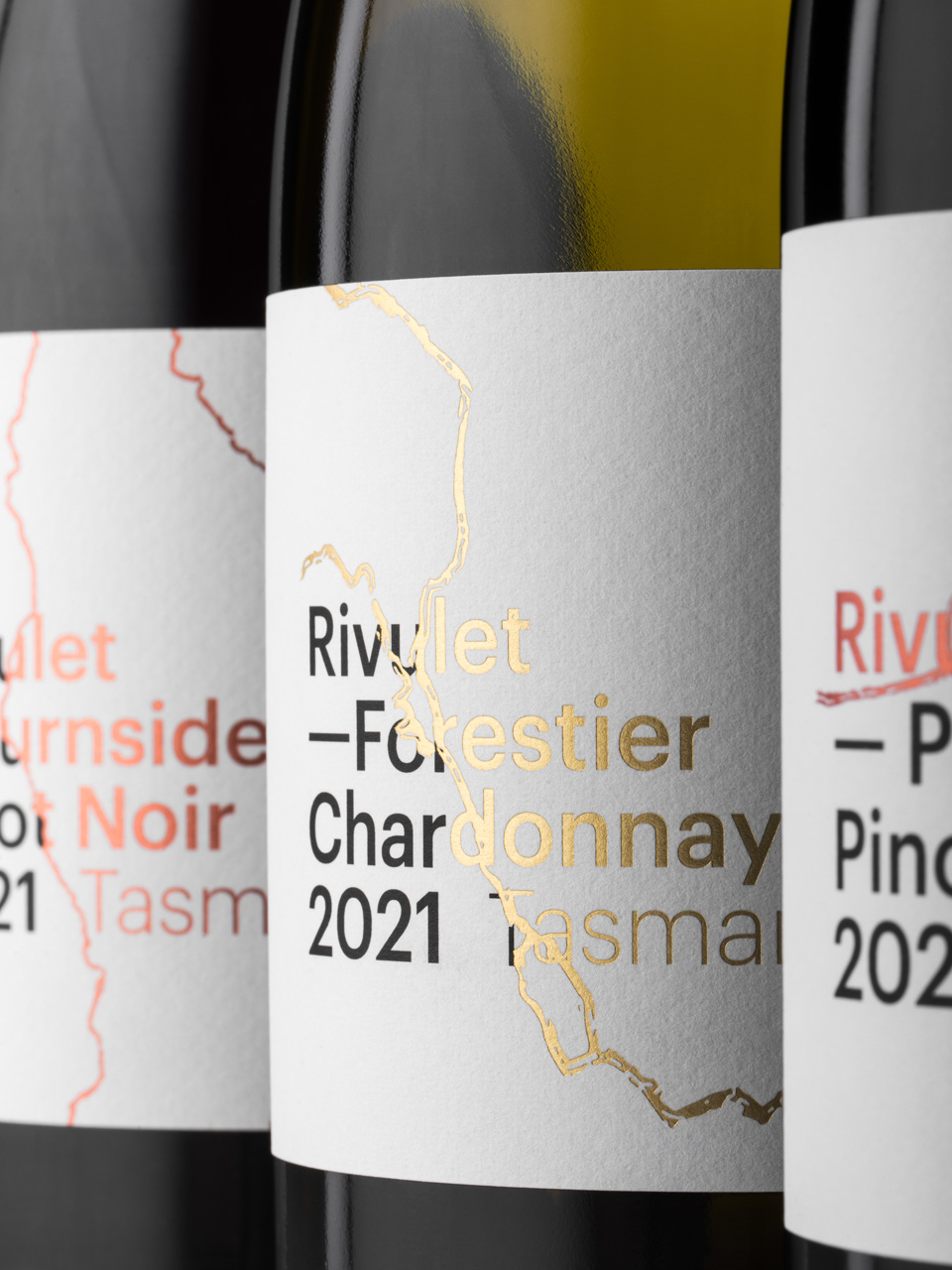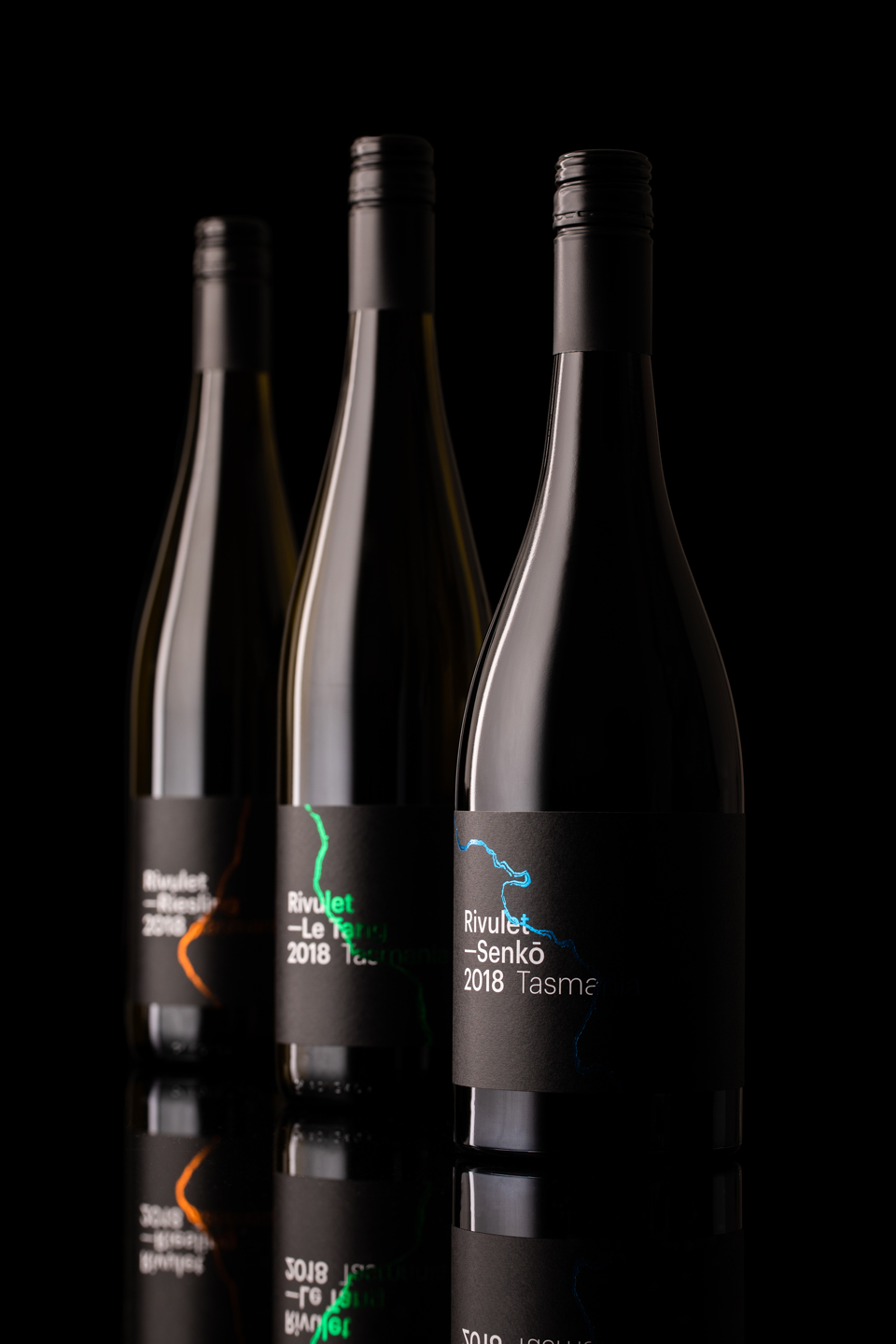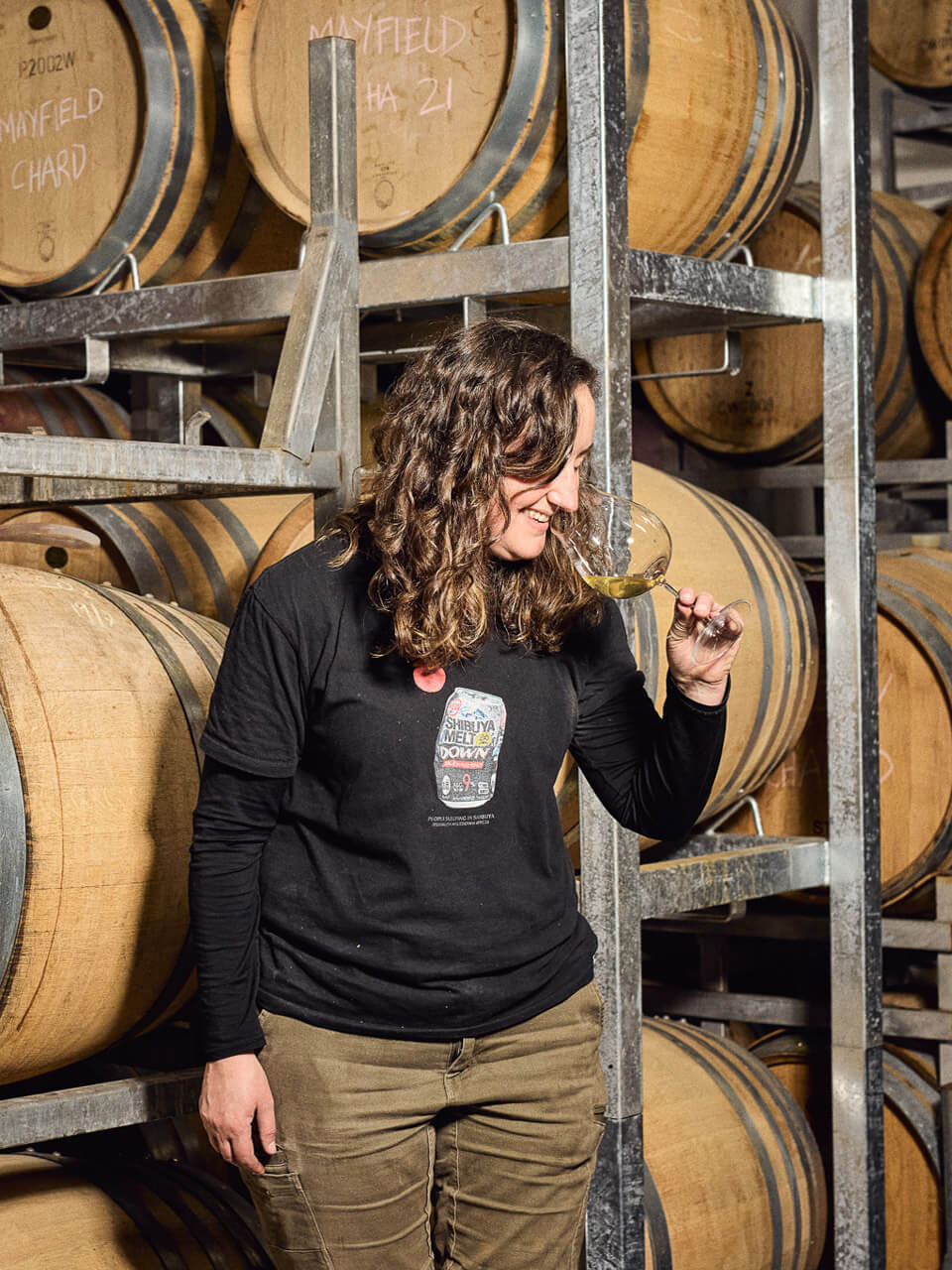Keira O’Brien started Rivulet Wines in part to attempt to save Tasmania’s oldest commercial riesling planting and in part to express her sense of creativity, which was being stifled in her contract-winemaking day job. Over the four vintages released, the portfolio has ebbed and flowed, with availability of the right fruit a key driver in her range. In 2022, she became the winemaker at the iconic east coast vineyard Freycinet, juggling her brand and one of Tasmania’s most vaunted. The Rivulet range consists of cross-regional pinot noir and a pair of single site offerings, with a single site chardonnay, barrel-fermented sauvignon blanc and a sylvaner filling the roster of wines, though a riesling will come back into the range from the 2023 vintage.
“Rivulet Tasmania is an opportunity to work with fruit that I see as a bit special and tilt the winemaking a little more playfully,” says O’Brien. “It’s small-scale stuff, and the name is a bit of a riff on that – tiny trickles of wine, rivulets of sweat on the brow. As I drove around the vineyards in Tasmania, I noticed there are no creeks signposted here, but so many rivulets. I liked the shape of the word and the fittingness of their meanderings with my own journey to wine.”
O’Brien grew up in North East Victoria, with a wealth of wine regions around her. “An appreciation for food and wine led to food writing and teaching wine classes as a side hustle,” she says. “Looking for something more tactile and creative, I worked in wine buying, distribution, sales and working vintages, while undertaking formal studies in winemaking and viticulture.”
Experience in McLaren Vale, the Yarra Valley, Hunter Valley and finally Tasmania led to five years with Tasmania’s largest contract winemaking facility, working with growers from all areas of the state. O’Brien primarily worked with pinot noir, chardonnay, riesling, pinot gris, sauvignon blanc and sparkling wine. An opportunity to work with a couple of tonnes of fruit from Tasmania’s oldest commercial riesling vineyard led to her launching her own label in 2019, with a wine from the 2018 vintage.
“What finally pushed me to make my own wines for Rivulet was hearing a grower talk about pulling out old riesling vines because they weren’t paying their way,” says O’Brien. “Anxious to ensure this didn’t happen, I convinced them to sell me half the fruit from the block, and I adopted some techniques used by noted producers in Rheinhessen, Germany. This allowed me to turn the spotlight on the provenance and quality of the fruit.”
That opportunity was not just about saving those vines, either. The strictures of contract winemaking can be suffocating for those more creatively minded. “In my previous winemaking role, I saw fruit from great vineyards being blended away and homogenised. Rivulet was a chance to put my own spin on from a handful of these special places. I was looking for an outlet to express my own ideas about winemaking, particularly around building layers of texture and retaining transparency of place and time,” says O’Brien. “I’d built relationships with excellent growers who continue to be wonderfully supportive of what I am doing.”
In 2020, O’Brien decided to shift her focus to growing Rivulet to becoming a meaningful business rather than a side project, while she took on a prime winemaking role in 2022. “After taking on the role of winemaker at Freycinet Vineyard, I’m now based on Tassie’s east coast, and embracing the Tassie coastal lifestyle,” she says. “Working with one of Tasmania’s oldest vineyards, I have the privilege of building on a long legacy of single vineyard winemaking. This dovetails nicely into my work with Rivulet Tasmania, where I continue to focus on small, special vineyards and creating wines of place.”
For now, while O’Brien has excellent contacts, she is at the mercy of fruit supply in any given vintage, with the cost of Tasmanian fruit spiralling upwards, and the availability spiralling down with ever-increasing demand. “The last few years in Tassie have been challenging,” she Says. “Small yields and tricky weather conditions have made me really value my close relationships with growers. Bigger players entering the region and vacuuming up as much fruit as they can has increased pressure on sourcing quality fruit. Even though the volume of wine I’ve produced has declined, the concentration and fruit purity has been fantastic.”
And while those challenges are ongoing, O’Brien is pleased to be returning to the roots of her brand this year. “I’m super-excited to be once again making riesling for Rivulet in 2023, with fruit sourced from older vines at one of my favourite vineyards. Making riesling from a cool site in a cool year means taking extra care to make sure there is plenty of sunlight on the fruit. In the winery, I’ll be looking to create texture and complexity in the wine.”
For O’Brien, the way a wine feels in the mouth is just important as how it tastes. “Texture informs my approach, often more than flavour,” she says “I believe that phenolics can be important and positive structural and textural elements within a wine. They need to be balanced by flavour and overall mouthfeel. I am often drawn towards parcels of fruit where I can create wines which lean into savoury flavours and texture.”
The aim with Rivulet, says O’Brien, is to create playful and expressive wines of place. “To do this, I focus on making good picking decisions, keeping the winemaking simple and unforced. Fruit purity, texture and balance are the guiding lights in my winemaking decisions. Tasmania provides many opportunities to create wines from varieties that I enjoy, and I get a kick out of taking varieties that others dismiss. Rivulet allows me the opportunity to engage in a creative, iterative process where the results are tangible and tactile. The blend of connection, science and instinct is highly stimulating for me. Creating wines that bring people pleasure and are part of their happy moments is deeply satisfying.”
O’Brien is aiming to steadily grow Rivulet over the coming years. The focus will remain on the classic Tasmanian grapes of pinot noir, chardonnay and riesling, but she’s also on the lookout for a site to plant varieties like gamay, trousseau, Rhône whites and syrah to that mix, while also giving her tighter control over the quality of fruit. “Getting to build a deep knowledge of the place where my wines are grown is the path I want to tread,” she says.
“I left a comfortable career in the business world to pursue winemaking, so it’s important to me to get to do that on my own terms. I wanted to create beautiful things, wine that would give people joy and colour their happy moments. To work with integrity and creativity. Rivulet allows me to do that… It’s hugely satisfying, and I feel like I’m only just beginning.”






